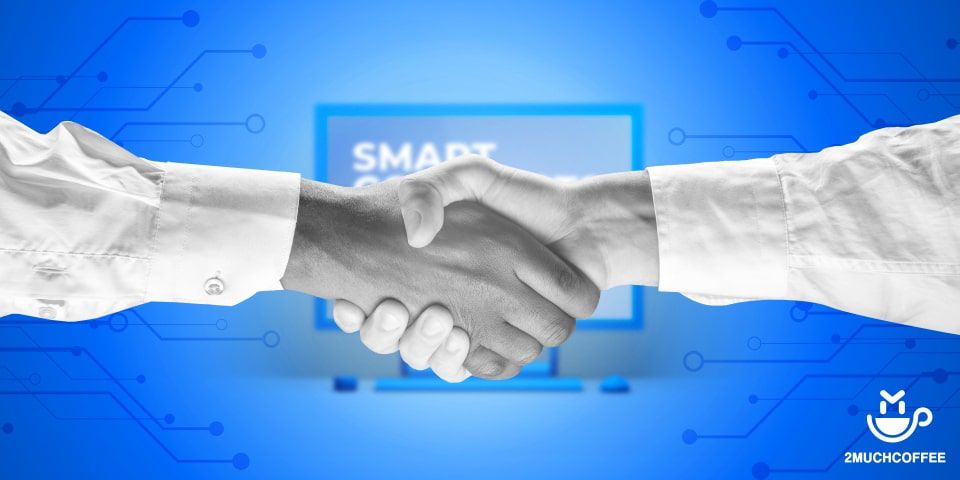The concept of smart contracts is not a new one and was introduced by cryptography experts 20 years ago. But the realization of these ideas in practice became possible only with the development of blockchain technology, which is compatible with all the necessary conditions for their execution.
Recently, smart contracts became a well-known opportunity to exchange existing assets like money, shares, and other property types without any intermediaries. In this article, we want to show how can the smart contract be used for your business.
What Is a Smart Contract?
A smart contract is a self-executing agreement built on the blockchain. It allows conducting transactions directly without the participation of third parties. Plus, because the data on the blockchain cannot be changed or manipulated by anyone - smart contracts built trust and transparency between parties since neither side can play with the contract terms.
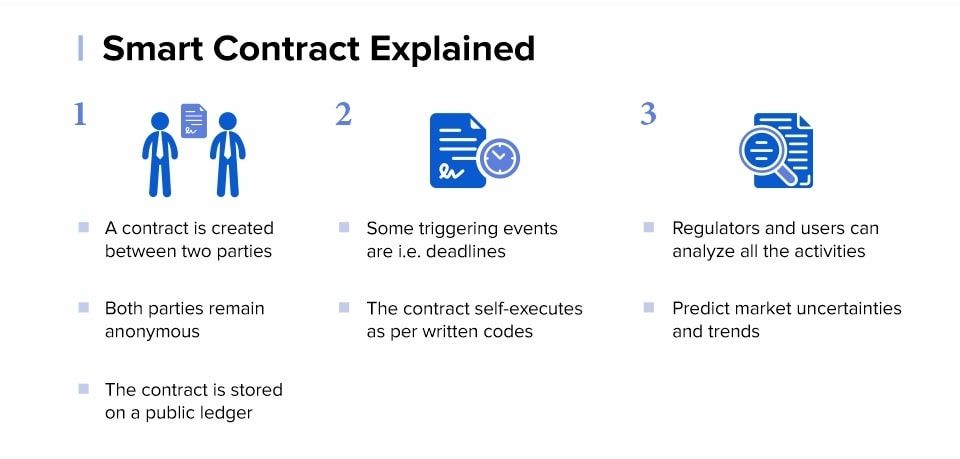
In some way, smart contracts became a logical development of blockchain technology after the emergence of cryptocurrencies. Nick Szabo first described smart contract technology in the 1990s. He defined smart contracts as a tool that formalizes and secures computer networks by combining protocols with a user interface. However, the practical implementation became possible with the advent of the blockchain in 2008.
Blockchain made it possible to get rid of the involvement of third parties and build a reliable system for creating automated contracts. Thanks to a decentralized blockchain system, the code can’t be arbitrarily changed or prevented from being executed without interfering with the entire network. So, a smart contract is managed only by the rules laid down in it.
How Do Smart Contracts Work?
In simple terms, a smart contract works like a deterministic algorithm. It performs certain actions when specified conditions are met. Based on this, the smart contract system often uses "if… then…" expressions. For example, if Party A transfers money, then Party B transfers item/property rights.
A classic example of a smart contract is a vending machine. A person puts the coin into the machine to get a drink or a snack. This interaction is an agreement that involves the purchase of the product for a set amount of money. The difference between our example and the traditional contract is that the machine self-executes the terms of agreement and transaction: if the payment has passed, then the machine provides a drink/snack.
A smart contract is the same as a traditional one, except that there is no need for trust between parties. Each party of the contract must trust the other party, hoping that he will fulfill the obligations of the agreement. The terms of the smart contract are executed automatically by a computer program without any exceptions. As soon as certain contract conditions are met, the smart contract executes the transaction and guarantees. Thus, a bet between two people about what the weather will be like tomorrow is another good example of a smart contract.
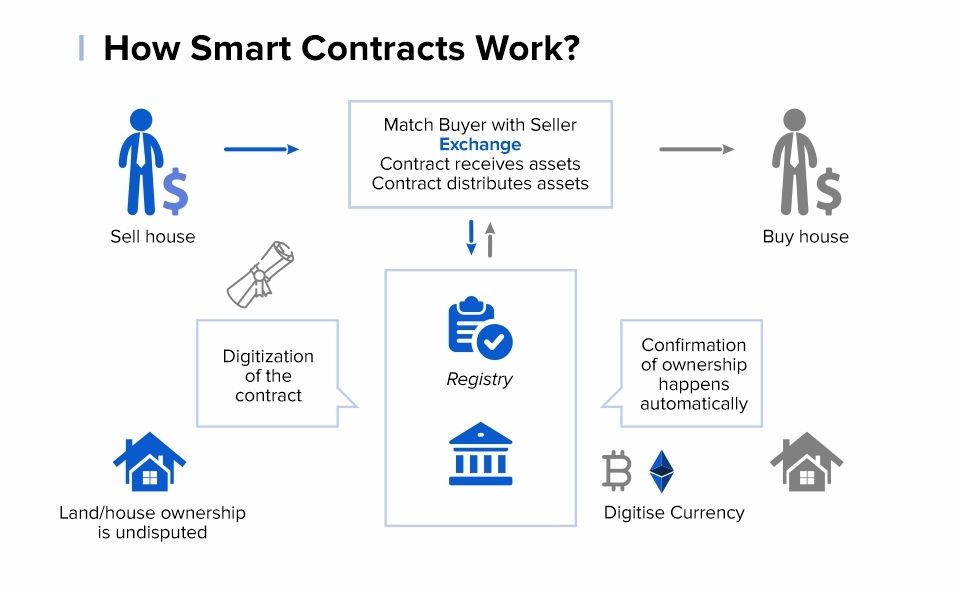
The primary platform for the implementation of smart contracts is Ethereum, as it provides the most opportunities for their realization. Using this system as an example, the way smart contracts work can be explained as follows:
The asset is introduced into the program and it independently monitors compliance with the contract terms;
Upon execution, the seller receives money, and the buyer – the goods.
In the Ethereum network, smart contracts are responsible for performing transactions between users (addresses). Any address that is not a smart contract is called a personal account (EOA). Thus, smart contracts are controlled by software code, and personal accounts are controlled by users.
Essentially, Ethereum smart contracts consist of a contract code (containing execution conditions) and two public keys. The first public key is provided by the creator of the contract. Another key is the contract itself, being a digital identifier unique to each smart contract.
The execution of any smart contract occurs during a blockchain transaction, and it can be activated when initiated by a personal account (or other smart contract). However, a sequence of smart contracts is always launched from a personal account (i.e., by a user).
The structure of any smart contract includes the following attributes:
The contract parties that have accepted the agreed conditions (for this, an electronic signature or multi-signatures, if there are several parties, is used);
The environment in which the contract will be located (for example, Ethereum);
The subject of the contract – namely, resources for exchange;
Terms of the contract – a description of the mathematically confirmed conditions under which the contract will be considered as fulfilled.
A smart contract will store all of the listed funds until the set goal is reached. If the goal is not achieved, then the money is returned to investors.
ERC-20
Tokens issued on the Ethereum blockchain comply with the standard also known as ERC-20. This standard describes the basic functions of all tokens based on the Ethereum network. These types of digital assets are often referred to as ERC-20 tokens and represent most of the cryptocurrencies in existence.
Many blockchain companies and startups are developing smart contracts to issue their digital tokens on the Ethereum network. After some sort of issuance, most of these companies distribute their ERC-20 tokens through an Initial Coin Offering (ICO). In most cases, the use of smart contracts made it possible to exchange funds and distribute tokens in a trusting and efficient manner.
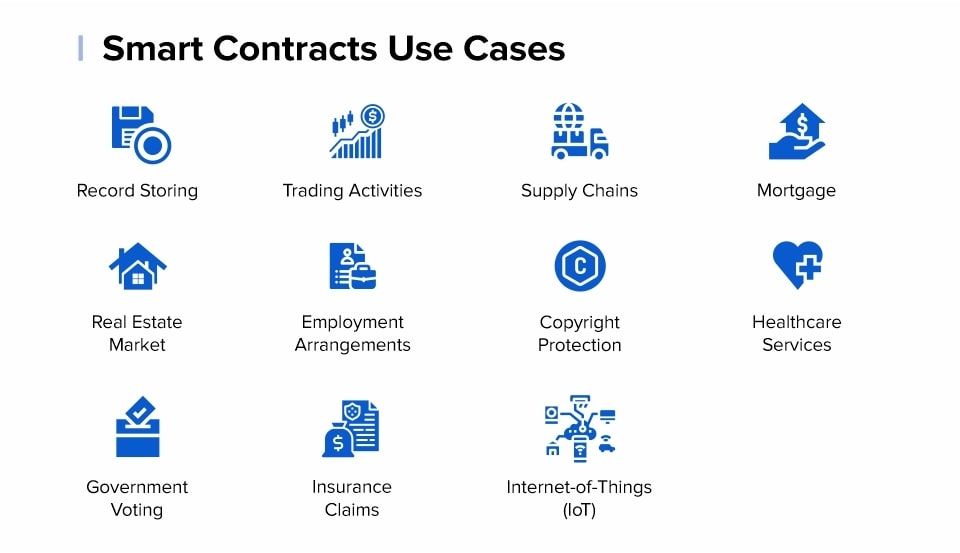
How Smart Contracts Can Be Used?
Since the smart contract is a transaction protocol, they are highly customizable and can be developed for different types of services and solutions.
As a decentralized and self-executing program, smart contracts can provide increased transparency and lower operational costs. Depending on the type of business, they can also improve efficiency and reduce costs. The benefits of smart contracts are particularly evident when it comes to money transfers or exchanges of funds between two or more parties.
In other words, smart contracts can be designed for a wide variety of use cases. Some of the examples include the creation of tokenized assets or shares, voting systems, cryptocurrency wallets, decentralized exchanges, games, and mobile applications. They can also be co-implemented, along with other blockchain solutions that address areas such as healthcare, supply chain, government, and decentralized finance (DeFi).
In the twenty-first century, there is the possibility of translating all kinds of paper contracts into digital smart contracts, and therefore a wide range of potential applications is emerging. Let’s consider some of them:
Automation of payments: the contract can be programmed to ensure that the requested amount arrives at the specified time to the specified persons or organizations.
Registration and change of ownership: The necessary documents can be registered on the blockchain to establish ownership from the start and change ownership through smart contracts.
Energy Transactions: This is believed to create a digital ecosystem for the exchange of energy. Thus, the sources of electricity or fuel will be associated with smart contracts concluded only between individuals or with organizations involved, which, in turn, can personalize the consumption of each client.
Intellectual property: You can embed a smart contract in any object that is digitally controlled. This is where the smart property is born that can be assimilated with networked IoT objects. They can range from home to cars. In this way, for example, the rental of these properties can be automated.
Also, cryptocurrencies such as Bitcoin can be viewed as a set of smart contracts that enforce property law. Cryptographic techniques are used to ensure that only the owner of the digital token can spend them. Several decentralized asset markets already exist, so that many different digital assets can be traded on the same blockchain. The same principle can be extended to physical products with electronic control or embedded microchips.
Financial Services: Cryptocurrencies obviously open up a wide range of different use cases for smart contracts that would not otherwise be possible. For example, systems like the one used by BurstCoin can run auctions that automatically check for the highest price at a given time and automatically transfer inactive funds.
Pros and Cons of Smart Contracts
Compared to traditional contracts, smart contracts have many advantages, and the most important of them is autonomy. Smart contracts are concluded by two parties, no intermediaries, and the blockchain ensures the implementation of the agreement. You don’t have to spend money on the services of a lawyer or notary. Also, you can be sure that no one will deceive you and the terms of the contract will be fulfilled.
Another advantage is speed. In smart contracts, all stages are as automated as possible and require the presence of a person only at the initial stages of creation. This significantly saves the parties time and speeds up the processing of documents.
Smart contracts are secure, as is the blockchain itself. The data recorded in the blockchain can’t be changed or destroyed, which imposes obligations on the parties. If one party didn’t fulfill its obligations, the other party would be protected by the terms of the contract anyway.
Cost reduction is what makes blockchain so attractive. Using smart contracts you save on involving additional specialists (lawyers, notaries, brokers), as well as on operating expenses. Such savings enable the parties to conclude an agreement on more favorable terms.
Nevertheless, this mechanism does have its drawbacks, like:
Legal status. Blockchain and cryptocurrencies are relatively new tools and in most countries, their legal status is not yet completely defined.
Creation complexity. They are based on the program code, which already creates difficulties for the average person. Also, when creating a smart contract, you need to provide several conditions and scenarios for the transaction, which is time-consuming.
Gas consumption. With every transaction client pays the fee, in gas, in order to execute so-called smart contract functions. On the Ethereum blockchain, gas is an execution fee used to compensate miners for the resources required to power smart contracts. And since network usage is progressively increasing, the gas costs are being millions of dollars per day. As the ecosystem continues to grow, so too will the value of gas optimization.
No flexibility. The data included in the blockchain can’t be changed during the interaction.
Innovative technology. Most people still do not clearly understand what smart contracts are and this prevents them from actively spreading.
Despite all the problems described, most experts agree that smart contracts are headed in a very promising direction and they have great potential to take a foothold in our lives in the future.
Smart Contract Market Forecast
Global Smart Contracts Market is expected to reach approximately 300 USD Million by the end of 2023 with 32% CAGR during the forecasted period from 2017 – 2023. The same research shows that Europe is the market leader for smart contracts. However, in the forecast period, North America is showing significant growth. This has greatly expanded the use of digital technology in countries such as the United States, China, Britain, and Japan.
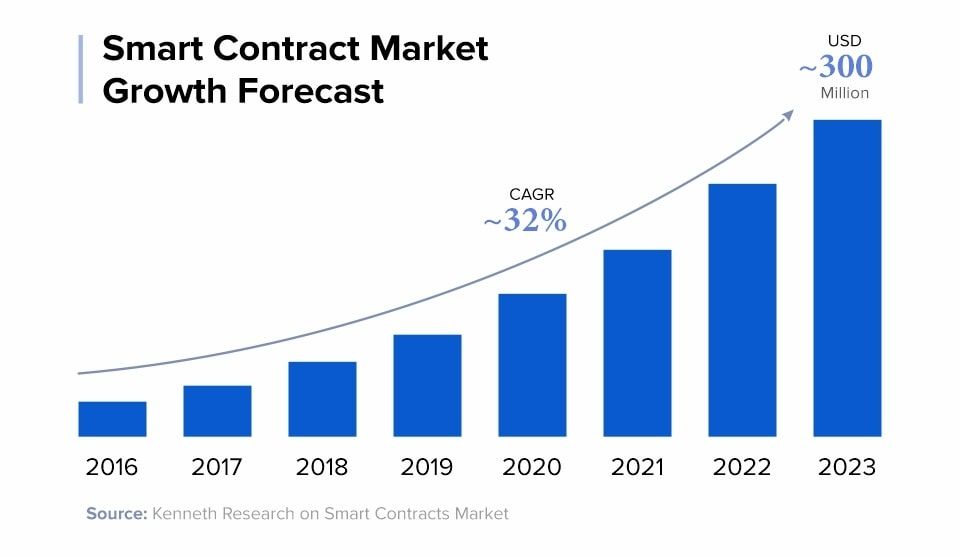
Market players in the regions are actively focusing on product innovation and implementing strategies that allow them to consolidate their market position. Many companies are also investing in mergers and acquisitions.
Final Thoughts
The creation of smart contracts is quite a new direction and certainly one of the most important technologies implemented in the blockchain. It clearly exceeds those centralized systems that are now used in many economic sectors. So, smart contracts introduce the new vision of running the business in various sectors.
Obviously, such benefits as cost savings, time-saving, security, and eliminating the need for intermediaries will contribute to the technology being distributed all over the world. If you are looking for a reliable partner to implement smart contracts in your business or you simply have a question about smart contracts, drop us a line in a contact form and we will help you!
